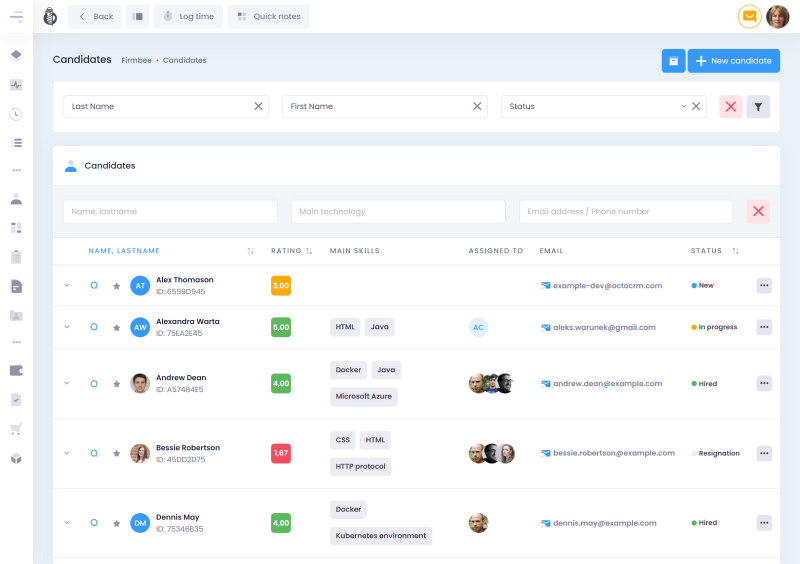When recruiting, it is frequently necessary to make a choice between candidates with similar skills, believing that both would probably perform well in their assigned role. However, it doesn’t always have to be the case that by rejecting one of the people, you lose touch with them – you can put them in your candidate base, following the concept of talent pooling. What is talent pooling, and what benefits can it bring to your recruitment processes, especially when sourcing suitable candidates is becoming more and more difficult? Read on to find out more.
What is talent pooling? – table of contents:
What is talent pooling?
Talent pooling is the process of collecting data on qualified candidates for potential positions and building a candidate base. Such a candidate base can be stored in Excel or a dedicated tool, for example, Firmbee. The purpose of talent pooling is to build relationships with people you have already got in touch with – you received their resumes and learned more about them – in order to offer them a job in the future . Thus, talent pooling shortens the recruitment process and ensures a better end result (as you know the candidates’ expectations, competencies and skills).

How to build a talent pool?
Your talent pool ought to include external candidates – both those who responded to your job ad and went through the entire recruitment process, but were not hired at the final stage, as well as those who were recommended to you or found through direct search on LinkedIn or other portals. Interestingly, the database of potential candidates should also contain your current employees as you may need their experience, skills and personality traits in the future, e.g., for new tasks, positions or roles.
You enter all the necessary data into the system or file and complete the personal profile, as well as add related documents to the person (resume, portfolio, cover letter, recruitment task, etc.). This way, when opening a new recruitment process, you will be able to check if you want to invite a person from the database for an interview.
Keeping the candidate database will bring the expected benefits only if it’s completed with the company’s future recruitment needs in mind. Recruitment needs are a response to the company’s development plans (e.g., introducing a new product, expanding internationally, entering new sectors or industries) – so they should be developed in accordance with the company’s long-term strategy.
It is worth differentiating people in the database from this angle, and also take into account various factors: their experience, language skills, training received, etc. It is also important to keep in mind that candidates are constantly developing, therefore you should update their profiles in line with the obtained information.

The benefits of talent pooling
What are the benefits of talent pooling? First of all, it should be pointed out that talent pooling saves the time that HR professionals spend on sourcing and selecting candidates they would like to get in touch with, since the ideal candidate may already be in their database (especially if they have taken care of their personal and professional development in the meantime). Consequently, recruitment costs are reduced, which is positively received by every company.
What’s more, by maintaining contact and building relationships with people from your talent pool, you ensure:
- A better candidate experience (even if the candidate is rejected), which is reflected in a positive opinion of your company as an employer,
- A perfect job fit – by reaching out to the person you have built a relationship with, you can be sure that their expectations and yours will be in line with each other, which increases the likelihood that the recruitment process will end successfully in a short time,
- A faster hiring process when the need to hire a new person suddenly arises (e.g. when a key employee quits), which is important when it comes to maintaining a continuity of operations in the company,
- A chance to hire a person with outstanding skills and fitting your company culture.
Summary
Talent pooling can bring a number of benefits to both the employer seeking new people for specific positions and the potential candidate. In this way, the former party gains a faster and more efficient recruitment process, while the latter gets a chance for an attractive job offer in the future, without having to search for it themselves.
However, it must be strongly emphasized that talent pooling is only one of the available recruitment methods – and whether it will work for you depends on your company’s hiring needs and even organizational culture. However, if you are having difficulty attracting new employees (especially those with outstanding skills), you should check whether this method will work for you.
Read also: 4 essential benefits of collaborative hiring
If you like our content, join our busy bees community on Facebook, Twitter, LinkedIn, Instagram, YouTube, Pinterest, TikTok.
Author: Nicole Mankin
HR manager with an excellent ability to build a positive atmosphere and create a valuable environment for employees. She loves to see the potential of talented people and mobilize them to develop.


















